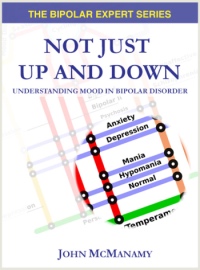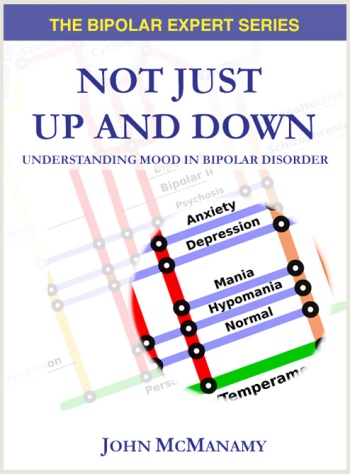Recovery FAQ
 |
Your definitive recovery cheat sheet.
|
What do you mean by recovery?
There is no precise definition, but basically recovery is a state where 1) you are reasonably satisfied with your ability to function (such as in work and relationships), 2) you have achieved a level of comfort within yourself, and 3) you are effectively managing your illness.
I will probably never work again, plus I have a lot of other issues. Does this mean I should just forget about recovery?
Absolutely not. You can still lead a productive and satisfying life without living according to society’s expectations. You get to choose the terms of your own recovery.
My New Book!

Purchase now.
So being less than what I was before I got ill is okay, recovery-wise?
Only if you make that choice, and this may be the right choice for you. Keep in mind recovery can also involve achieving a state BETTER than the one you were in before you got ill, even if you have to cut back on your expectations.
Better? In what way?
Dealing with our illness tends to change us in many ways. We may experience an emotional healing, where we feel an inner peace within ourselves. Do not discount these intangibles.
Can you explain the distinction between the medical model and the recovery model?
It’s a false distinction. Recovery is practically always a non-starter without medical treatment. But unless you’re one of the lucky ones, meds will only take you so far. The rest is up to you.
So what’s the real distinction?
The real distinction is between stability and recovery. Basically, we see our doctors in a state of crisis. It is understandable, then, that our doctors focus on getting us out of crisis and getting us stable. They will also work to clear up our symptoms. But even stable and symptom-free we are often not well and have problems functioning.
So what are our choices?
Ironically, a lot of it has to do with the things doctors have always told their patients to do, including good lifestyle practices, such as diet, exercise, and sleep. But patients - with equal respect to tradition - hardly listen.
What about diet?
Diet is crucial to good mood. When choosing a healthy diet, there are no right or wrong choices, though in general high fat, high sugar, and high carb diets should be avoided, and junk foods, caffeine and alcohol restricted. Folate (from leafy green vegetables) deficiency and high sugar intake have been linked to depression. Carbohydrates get processed into sugar, which can boost serotonin but also induce mood-busting sugar crashes. Chocolate can act as a tasty antidepressant, with an endorphin-like effect, but can also set one up for a sugar crash. Paradoxically, eating too much sugar can lower blood sugar levels in some people, which results in further unhealthy cravings. Be mindful about switching to artificial sweeteners, though. Some people are particularly sensitive to aspartame, which is found in many foods.
What about exercise?
Numerous studies have found aerobic exercise works as effectively as antidepressants. Generally, the last thing you want to do when you're depressed is exercise, but even a five minute walk can help. Exercise restores regular sleep and eating, raises energy levels, generates endorphins, boosts serotonin levels, and may stimulate new brain cell growth.
What about sleep?
Too little or too much sleep affects just about everyone with a mood disorder. For most of us, sleep is half the battle, and for many of us the full battle. Conquer sleep and you may conquer your mood disorder. A major key to establishing good sleep hygiene is going to bed and waking up at a regular hour. For those who continue to experience difficulties, talking therapy can help, as well as sleeping pills and wakefulness agents.
What about avoiding stress?
Stress is toxic to anyone with a mood disorder, so every effort needs to be made to reduce stressful situations from one's life and develop appropriate skills for coping. This may involve major life decisions regarding work and personal relationships. Numerous talking therapies can help people work through difficult job and relationship situations so that stress is less of a factor in one's life. Therapy can also teach a range of coping skills. Other coping strategies include exercise, meditation, yoga, and relaxation exercises.
What about religious or spiritual practice?
A multitude of studies have found those who are religious or spiritual live longer, are healthier, recover from illnesses quicker, and are less depressed. Much of this undoubtedly has to do with the support one gets from one's religious community, as well as the more healthy lifestyles these people tend to lead, not to mention the comfort that belief in a higher power can bring. In addition, the exercises and practices associated with religion and spirituality such as meditation, prayer, and yoga have positive benefits on mental and physical health. Scientists also speculate the immune system and other biological processes may be enhanced by religious or spiritual practice. Finally, don't rule out pure God-power.
What about attending a support group?
A major study found that online support groups have a positive impact on depression. Face to face support groups have a similar benefit. At a support group, you meet people who have walked in your shoes, who have unique insights into the illness that they are all too happy to share, and are willing to be with you in a time of crisis. If not a support group, reaching out and finding your own network is vital.
What about mindfulness?
Mindfulness is the mind watching the mind. By cultivating a state of heightened awareness, we can often catch our mood swings before they happen. This involves being closely attuned to our mood and energy levels and other potential triggers, then acting quickly, while we still have the option of acting. Often the solution may be as simple as stopping to smell the roses or getting a good night’s sleep or getting out of the house.
And all these recovery techniques are scientifically validated?
Absolutely. We know you will die without decent food. We know exercise is good for you. We know you can’t function without sleep. We know what stress does to the heart and brain and every organ in the body. We know that religious/spiritual practice are excellent stress-busters. We know that patients who seek support have better outcomes. We know that successful patients practice mindfulness, whether they are aware of the term or not.
How do I cope day to day?
Over time, you will develop your own personal bag of tricks. These can range from prayer to keeping a journal to taking some time out for yourself to volunteer work. In general, any project that makes it worth your while to get out of bed or any activity that induces you to get out of the house and be with other people should be regarded as beneficial.
I am feeling suicidal. What should I do?
Get help immediately. Treat this as a crisis every bit as life-threatening as a heart attack, which it is. Every year, one million people worldwide die by their own hand, most as a result of depression or a depression-related illness. The true figure is probably many times higher, disguised as death by accident or death by risky behavior. Contact a trusted friend or family member. Just as someone with a heart attack goes to the emergency room, that is where you should be, unless someone competent has decided you are not in danger.
How should I prepare for a suicidal crisis?
Have a good support network in place, people you can contact at a moment's notice. Have a good relationship with your doctor or psychiatrist, as you may need to call him or her in the middle of the night.
How can I help others in a suicidal crisis?
Be supportive. Do not be judgmental. Treat the situation as life-threatening, which it is. Ask if he or she has a plan - this can determine how serious the problem is. If you are in a position to do so, offer to take positive action, such as calling his psychiatrist or driving him or her to the emergency room.
My illness has ruined my life. It has destroyed my relationships and my career.
It is pointless to disregard the full destructive power of a mood disorder, and because of it some people may have to considerably scale back their expectations in life. On the positive side, you have survived one of the most malevolent forces on the planet, and you are a much stronger person as a result, in closer touch with your own humanity and divinity. Please do not underestimate these gifts and the power you now have to lead an even deeper and more meaningful life, however different it may be from the one you had been pursuing.
Do you have any final thoughts?
Yes. Depression and bipolar disorder may be two of the worst illnesses we know, and the treatments may leave a lot to be desired, but you are not powerless. Learn everything you can and apply your knowledge to fighting this illness with everything you've got, with every weapon available. Measure personal success on your own terms, not on society's. Simply living with this illness is a major achievement, so give yourself credit. To those who haven't sought out help, please do. As imperfect as the treatments are, they offer you an excellent chance of winning back your life. To people still struggling with their treatment and recovery, do not abandon hope. We are getting smarter every day, and you may be the next beneficiary.
Feb 10, 2008, updated Jan 2, 2011
 |
More articles on recovery. |




